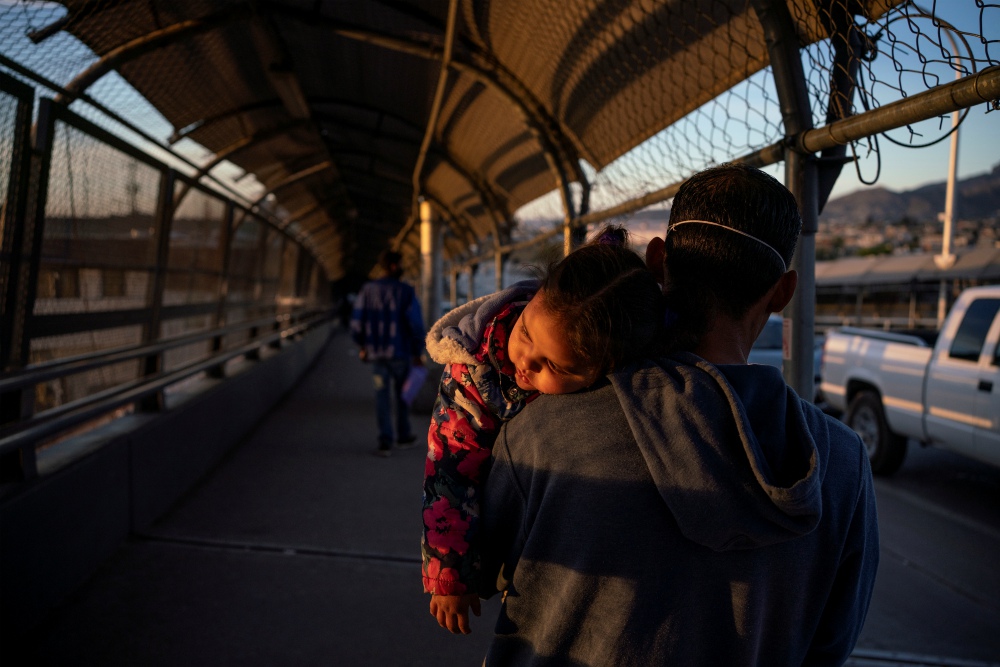
A Honduran immigrant near El Paso, Texas, walks back to Ciudad Juárez, Mexico, April 20, after U.S. Customs and Border Protection changed his family's dates for immigration court during the coronavirus pandemic. (CNS/Reuters/Paul Ratje)
By the time my mom reached her 80s, she unabashedly exercised the elders' privilege of speaking her mind, no matter the public, no matter the reaction. When hearing people talk about closing our borders and not accepting refugees, she would ask the speaker, "And what Native American nation are you from?"
If she started that conversation in the evening with a sip of scotch in her hand, it was apt to go on for a while. She was proud and grateful for her forebears who fled the potato famine to make a better life in this country at a time when the Irish were far more tenacious than welcome.
Today's reading from Exodus tells us how God expected a free people to organize their society. The first principle was to remember from where they had come. No pious Jew could hear God promise to hear the cries of the widow or alien without recalling the passage from Exodus where God said to Moses, "I have witnessed the affliction of my people, I know what they are suffering, therefore I have come to rescue them."
God called the people of the covenant to remember the suffering of the past, not to take revenge, but to practice with others the same compassion that God had shown them.
The selection from Exodus hones a sharp edge on today's familiar Gospel. After Jesus had been peppered with picky questions that he consistently put in a broader perspective, some moral theologians decided to ask him the most basic question of all: "Which commandment is the greatest?"
Whether sincere or conniving, they were asking the core question of every human life: "What's it all about?" or "What does God expect from humanity?"
We all know Jesus' answer. When he said: "You shall love God with all your heart, soul, and mind," he was paraphrasing Deuteronomy 6:4-5, a core Jewish prayer called the Shema. Jesus was not alone in declaring that the Shema summarized all one needed to know about life. Faithful Jews recited this prayer, the Shema, morning and night, and hoped it would be the last thing they spoke on their deathbed.
Nor would it have surprised people when he added that the second command was "like it," meaning that the second is implied in the first.
"You shall love your neighbor as yourself." This is the third time Jesus refers to love of neighbor in Matthew's Gospel. His first and definitive pronouncement came in the Sermon on the Mount when he called for equal love of neighbor and enemy. By saying that love of the other was akin to love of God, Jesus declared that they were inextricably bound together in creating a lifestyle of love.
Altogether, Jesus calls for a four-directional love: love of God, self, those who are close to us, and those whose purpose and way of life seems entirely different or even antagonistic to ours.
Advertisement
When we analyze those four dimensions of a loving life, we see that we are called to love in two directions: love of the familiar and love of what is not like us. Obviously, for emotionally healthy people, love of self and neighbor, love of those who think and act like we do, comes naturally. This love affirms us and makes us comfortable.
Jesus' message calls us to go further, and learn to love those who think and act differently. Jesus taught that love of God and others expresses two dimensions of the same love. The insight hidden inside that teaching is that without love of the other, especially the stranger and even our enemy, we become caught in a one-dimensional self-love that inevitably leads us to conceive of God in our own image.
Without loving contact with people whose experience, culture, or faith tradition stretches us, we can live trapped in a self-affirming hall of mirrors. The God who is bigger than we can ever imagine commands us to love the other lest we fall into narcissistic idolatry.
The combination of our readings from Exodus and Matthew presents us with a call in two dimensions. The first is to remember from where we come, to allow our gratitude for God's love to impel us to give to others what we have received for no merit of our own. The second dimension, the one that adds depth to our perception, is to realize that only by knowing and loving people who stretch us can we begin to know and love the God who is greater than all of this diverse creation.
Today's readings remind us that the alien, widow and orphan, the people most in need at our borders and in our midst, are the people through whom God wants to free us from the confines of our own tribes and idols.
[St. Joseph Sr. Mary M. McGlone serves on the congregational leadership team of the Sisters of St. Joseph of Carondelet.]
